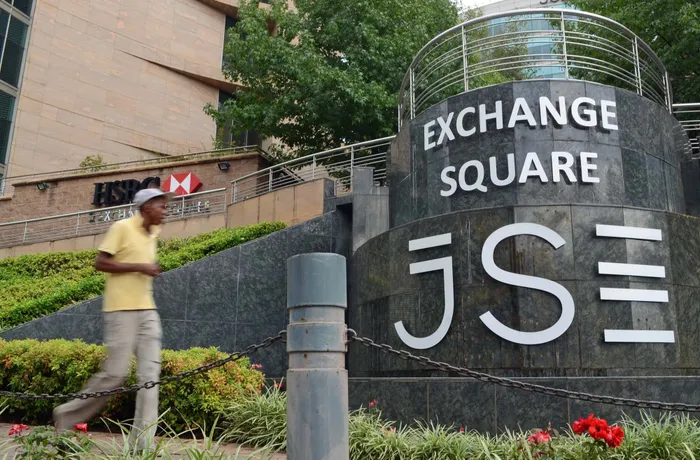Stocks, rand in bear market territory over fears of rate hike, power crisis

The JSE All Share Index fell below the 80 000 points mark yesterday after hitting the all-time record high earlier this week. Picture: Timothy Bernard (ANA)
South African stocks and the rand fell into a bear market yesterday for the second day in a row over fears of another interest rate hike amid heightened concerns over the ongoing power crisis.
The JSE All Share Index fell below the 80 000 points mark yesterday after hitting the all-time record high earlier this week, as investors awaited the South African Reserve Bank (SARB) decision on monetary policy.
Among sectors, industrial and resource sectors were among the worst performers led by Sasol, which in intraday trade fell by as much as 7.9% and Thungela Resources at 2.6%, while pharmaceuticals and retailers shares went up.
The central bank is widely expected to deliver a 50 basis points rate hike, following a 75 basis points increase in November and after raising interest rates by 350 basis points since November 2021, as the rate of headline consumer inflation remains elevated at 7.2%, way above the upper limit of the SARB’s 3-6% target range.
If the SARB’s Monetary Policy Committee (MPC) approves this rate hike, it would bring borrowing costs up from 7% to 7.5% per annum, the highest since June 2015.
Since the November meeting inflation has declined further from 7.4% to 7.2% and core inflation, which excludes volatile items of food and energy, came out at 4.9% from 5.0%.
However, the MPC also considers developments in international markets to the extent that they impact the currency and hence inflation when setting monetary policy.
The US Federal Reserve has signalled that rates will still have to rise significantly and steadily until they are sufficiently restrictive.
Since the last MPC in November, China has removed most of its Covid-19 era restrictions and the reopening of that economy is expected to give a significant boost to global growth.
Sanlam Investments head of fixed interest Mokgatla Madisha said they expected the MPC to raise the repo rate by 50 basis points to 7.5% as a restrictive policy stance was a necessary step to bring inflation back within the target.
Madisha said high rates will support the currency against still rising rates in developed markets and possible greylisting by the Financial Action Task Force.
“We can also expect the MPC to spend a lot of time on the ongoing electricity crisis in the country and its impact on growth,” Madisha said.
“A negative output gap, being the difference between current growth rate and potential growth rate, should generally lead to lower inflation as demand is generally weak.
“However, chronic load shedding is impacting the supply side of the economy too. In recent days we have seen newspaper articles about how food supplies are being affected by lack of electricity.”
Meanwhile, the rand was trading around R17.20 against the US dollar yesterday, holding close to the lowest in a month as investors continue to fret about the looming global economic slowdown and the ongoing energy crisis.
Investec chief economist Annabel Bishop yesterday said they were forecasting economic growth at the start of January, at 1.1% year-on-year for this year, but material risks to this included the recent worsening of South Africa’s electricity crisis, along with Transnet’s rail and port capabilities, which threaten exports.
“South Africa’s terms of trade deteriorated in general over last year from the second quarter, as sentiment deteriorated on the economic outlook, negatively affecting economic growth and trade, and weakening the rand,” Bishop said.
Power cuts have worsened since the beginning of the year after struggling state utility Eskom resolved to implement its worst-ever outages until further notice.
Eskom this week failed to give Parliament a forecast of when it would end load shedding, but instead said that it would take at least two years to shore up the national grid and lessen power outages to a manageable level.
The Portfolio Committee on Public Enterprises, the Portfolio Committee on Mineral Resources and Energy as well as the Select Committee on Public Enterprises and Communication will over the next two days meet various stakeholders at Eskom to assess efforts to resolve South Africa’s energy crisis.
The committees yesterday said they were adamant that the constant load shedding was having an adverse impact on the country and is exacerbating its socio-economic challenges.
Some of the issues to be addressed during the meetings include the security of electricity supply, the operational state of all power stations, governance at the entity, solutions to the current load shedding, as well as alleged sabotage and theft at power stations.
“The aim of the interaction is to assess the interventions being rolled out to address the energy challenge and ensure security of energy supply,” said Khaya Magaxa, the chairperson of the portfolio committee.
“A secure energy supply will add impetus to efforts to grow the economy and address the unemployment challenge.”
BUSINESS REPORT